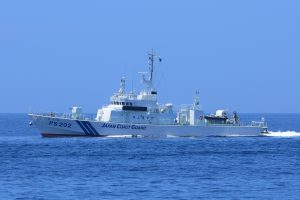Earlier this month, the Japan Broadcasting Corporation (NHK) reported that the marine research vessel Xiangyanghong 22 (total length 89.65 meters, gross tonnage 3,381 tons), which belongs to the East China Sea Bureau of the Ministry of Natural Resources of the Chinese government, was confirmed to have conducted “marine scientific research” (MSR) in Japan’s exclusive economic zone (EEZ) off the coast of Amami Oshima in Kagoshima Prefecture from September 28 through October 5, without having obtained permission from the Japanese government. A patrol boat of the 10th Regional Coast Guard Headquarters observed that what seemed to be wires and pipes had been thrown into the sea from the side of the Xiangyanghong 22.
It is thought that the Xiangyanghong 22 was collecting data on seabed topography, water temperature, tides, and salinity in the area.
At a press conference on October 2, Chief Cabinet Secretary Hayashi Yoshimasa of the Japanese government stated that “The Japan Coast Guard kept requesting the Xiangyanghong 22 to suspend its survey activities in Japan. We also used diplomatic channels to inform the Chinese government that we do not tolerate marine scientific research in Japan’s exclusive economic zone conducted without consent, explaining that this is exceedingly regrettable and strongly urging them to suspend their activities immediately. We will continue to respond resolutely and calmly.”
Article 246(1) of the United Nations Convention on the Law of the Sea (UNCLOS) stipulates that “Coastal States, in the exercise of their jurisdiction, have the right to regulate, authorize and conduct marine scientific research in their exclusive economic zone and on their continental shelf in accordance with the relevant provisions of this Convention.” Article 246(2) of the Convention stipulates that if a state wishes to conduct marine scientific research in the exclusive economic zone and on the continental shelf of another state, such activities should be “conducted with the consent of the coastal State.” Article 248 of the Convention meanwhile requires that a state intending to conduct MSR in the EEZ of another state provide a satisfactory explanation of the nature and purpose, the methods and means used, the dates and geographic scope of the research to the coastal state “at least six months prior to the planned start date of the research.”
As in the case of the MSR recently conducted by the Xiangyanghong 22, MSR conducted in the EEZ of a coastal state such as Japan violates Article 246(2) of UNCLOS. The Japan Coast Guard can request the suspension of illegal MSR when encountered in those marine areas.
There is also a framework of mutual advance notification for MSR in the East China Sea between Japan and China, which was established through an exchange of verbal notes in February 2001 and which is separate from the MSR-related regulations of UNCLOS. Under this framework, when conducting MSR, the name of the researching agency, the name, type, and persons in charge of the vessels used, and the outline, duration, and geographic scope of the research must be provided to the other country at least two months prior to the planned start date of the research. While UNCLOS requires informing the other country “at least six months prior” to the planned start date of the research, the Japan-China framework of mutual advance notification requires information “at least two months prior,” thus relaxing the MSR-related regulations of UNCLOS. The formulation of this framework of mutual advance notification between Japan and China did for a time result in fewer instances of MSR by China without Japanese consent. Starting about 2003, however, China has expanded its research areas to Japan’s EEZ (such as the waters around Okinotorishima) beyond the East China Sea. Moreover, since 2006, China has resumed MSR without Japan’s consent in the East China Sea, disregarding the Japan-China framework of mutual advance notification.
It is important that the Japanese government does not tolerate China conducting MSR in Japan’s EEZ without consent, but instead acts in accordance with Japanese law, based on the MSR-related regulations of UNCLOS. Japan must step up patrols in its EEZ to ensure the enforcement of the regulations.
At present, Japan has yet to enact any law that directly regulates MSR in Japan’s EEZ, because Tokyo wants to encourage MSR as a nation built on science and technology. Under a 1996 guideline among Japanese government ministries and agencies, namely “Handling of Scientific Research by Foreign Countries in Japan’s Territorial Waters, Exclusive Economic Zone, or Continental Shelf (Guideline),” Japan uses diplomatic channels to request countries (parties) intending to conduct MSR to apply for prior consent at least six months before they plan to start the research. In March 2011, the Cabinet Secretariat Headquarters for Ocean Policy decided that the relevant ministries and agencies should work together to review the guideline and discuss how the system can be developed, all the while operating the system for advance consent applications based on the guideline as applicable. That was well over a decade ago, and Tokyo still has not passed any legislation to regulate MSR or reviewed the guideline. It is time it did so.
TSURUTA Jun is an associate professor at the Faculty of Law, Meiji Gakuin University.




























